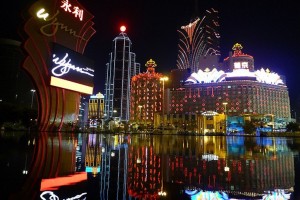In the past, Macau has made itself known as a gamblers paradise, especially for those who can and will play for very high stakes. These high rollers, mostly from mainland China, have long preferred Macau to other world gambling hubs, including Las Vegas. So far, this has brought unimaginable wealth and uninterrupted growth… until the rules of the game began to change, that is.
As Beijing proceeds to tighten control over Macau’s gambling industry in general, and the flow of funds in particular, its heavy reliance on high stakes customers seems to have turned from an asset into a liability. The tougher enforcement has scared off many of the high rollers, who can spend tens or even hundreds of thousands on a single bet. And, just as importantly, there are implications that restrict the activities of the junket operators, who facilitate the flow of funds, often illicit, back and forth from mainland China.
The upshot is that last year revenues dropped for the first time since the gaming industry was legalized there. In fact, in 2014, the six casino stocks lost a total value of nearly 100 billion dollars. Total gambling revenue fell 2.6% for the year, and December proved to be about 30% less profitable that the same month a year earlier.
Although doubt seems to have permeated the market lately, there is little doubt as to the main reason behind the recent disappointing numbers. Words bandied about, such as “crackdown” and “tightening” are in fact part of a larger government plan to tackle corruption. For Macau it will mean, very broadly, diversification. This is already evident in the reduction of high stakes VIP traffic. It can also be seen in the expansions casinos are currently making.
As VIP revenue declines, Macau’s gaming operators have made a concerted effort to go after the smaller fish, building new complexes that cater more toward tourism, entertainment and even retail. The fact that casinos are investing heavily in these areas shows that they do not believe recent moves to be a temporary “tightening” by the government, but somewhat more like a seismic shift. The South China Morning Post quoted an anonymous casino industry leader as saying, “This is big; they’re calling it the ‘new normal’ here in Macau. This is direct control over transactions by the Ministry of Public Security. It’s serious and key people are going to be scared.”
Messages from the highest levels of government also confirm that they are determined to see Macau develop along a different path than it has historically. Chinese President Xi Jinping has urged diversification in Macau’s economy, which currently relies on gambling for 80% of its revenues. He put forward a vision of the peninsula as a future world class tourism and leisure destination.
Night Lights in Macau – Photo Kashmut
More restrictions in 2015?
The government is using various means to accomplish the long-term goal, and they seem undeterred by last year’s numbers or those who might not approve. Beijing continues to push ahead with its plans as both the stock markets and high stakes customers grow skittish. Among those who stand to lose the most from the changes are the junkets. Although, according to Wendy Wong, spokesperson for Macau’s Gaming Inspection and Coordination Bureau, assured that there were actually no new rules, the enforcement of existing rules has become much more stringent. The bureau recently sent out a letter to junket operators “reminding” them to submit proper documents, including criminal background checks for all of their agents.
That in itself may be a game-changer for the junkets, organizations which have to date been the crucial facilitators for high stakes players to mobilize funds. Incidentally, they have also always been associated with the murkier aspects of Macau, some of them almost synonymous with organized crime syndicates.
Another example of the government’s increased scrutiny can be seen in the case of UnionPay, the state-backed bank that provides a card service sometimes used to transfer money from the mainland to Macau. The Public Security Ministry’s Economic Crimes Investigation Bureau will now have electronic access to all transfers using UnionPay to look out for any activity they deem suspicious.
Adding to the cooling effect are a range of other measures, ranging from visa restrictions to a ban on smoking. To those who have been watching the industry in Macau for any amount of time, the moves likely come as no surprise. Credit Suisse commented, “While we don’t rule out that there may be new measures in the future, judging from what we hear, this seems to be old news.” Still, the immediate impact on Macau’s gaming industry is undeniable.
What remains to be seen is whether these are just passing growing pains caused by the government’s long view of development for Macau, or the beginning of the end of gaming as Macau has known it. Then again, experienced gamblers might take a look at the odds of each extreme and conclude that, in the end, it is likely to be something in between.





